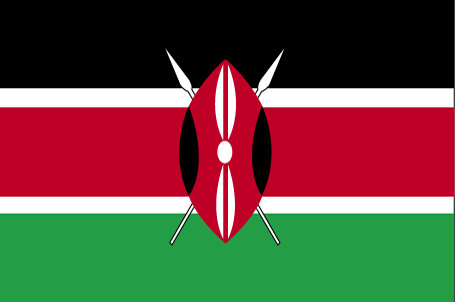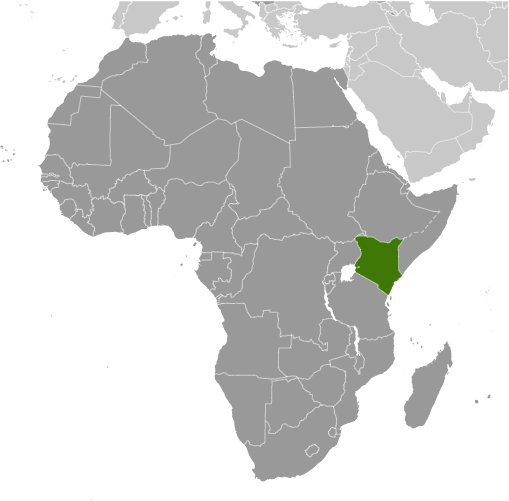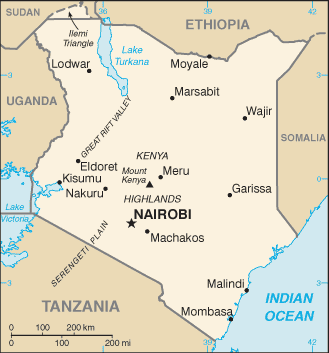Founding president and liberation struggle icon Jomo KENYATTA led Kenya from independence in 1963 until his death in 1978, when President Daniel Toroitich arap MOI took power in a constitutional succession. The country was a de facto one-party state from 1969 until 1982 when the ruling Kenya African National Union (KANU) made itself the sole legal party in Kenya. MOI acceded to internal and external pressure for political liberalization in late 1991. The ethnically fractured opposition failed to dislodge KANU from power in elections in 1992 and 1997, which were marred by violence and fraud, but were viewed as having generally reflected the will of the Kenyan people. President MOI stepped down in December 2002 following fair and peaceful elections. Mwai KIBAKI, running as the candidate of the multiethnic, united opposition group, the National Rainbow Coalition (NARC), defeated KANU candidate Uhuru KENYATTA and assumed the presidency following a campaign centered on an anticorruption platform. KIBAKI's NARC coalition splintered in 2005 over the constitutional review process. Government defectors joined with KANU to form a new opposition coalition, the Orange Democratic Movement, which defeated the government's draft constitution in a popular referendum in November 2005. KIBAKI's reelection in December 2007 brought charges of vote rigging from ODM candidate Raila ODINGA and unleashed two months of violence in which as many as 1,500 people died. UN-sponsored talks in late February produced a powersharing accord bringing ODINGA into the government in the restored position of prime minister.
Population
40,046,566
Country comparison to the world:33
note:estimates for this country explicitly take into account the effects of excess mortality due to AIDS; this can result in lower life expectancy, higher infant mortality, higher death rates, lower population growth rates, and changes in the distribution of population by age and sex than would otherwise be expected (July 2010 est.)
Nationality
Noun: Kenyan(s)
Adjective:Kenyan
Ethnic groups
Kikuyu 22%, Luhya 14%, Luo 13%, Kalenjin 12%, Kamba 11%, Kisii 6%, Meru 6%, other African 15%, non-African (Asian, European, and Arab) 1%
Religions
Protestant 45%, Roman Catholic 33%, Muslim 10%, indigenous beliefs 10%, other 2%
note: a large majority of Kenyans are Christian, but estimates for the percentage of the population that adheres to Islam or indigenous beliefs vary widely
Languages
English (official), Kiswahili (official), numerous indigenous languages
Country Name
Conventional long form:Republic of Kenya
Conventional short form:Kenya
Local long form:Republic of Kenya/Jamhuri ya Kenya
Local short form:Kenya
Former:British East Africa
Government Type
republic
Capital
Name:Nairobi
Geographic coordinates: 1 17 S, 36 49 E
Time difference:UTC+3 (8 hours ahead of Washington, DC during Standard Time)
Administrative divisions
7 provinces and 1 area*; Central, Coast, Eastern, Nairobi Area*, North Eastern, Nyanza, Rift Valley, Western
Independence
12 December 1963 (from the UK)
National Holiday
Independence Day, 12 December (1963)
Constitution
12 December 1963; amended as a republic 1964; reissued with amendments 1979, 1982, 1986, 1988, 1991, 1992, 1997, 2001, 2008; note - the 2008 amendments established the coalition government and the position of prime minister
Legal system
based on Kenyan statutory law, Kenyan and English common law, tribal law, and Islamic law; judicial review in High Court; accepts compulsory ICJ jurisdiction with reservations; constitutional amendment of 1982 making Kenya a de jure one-party state repealed in 1991
Suffrage
18 years of age; universal
Executive branch
Chief of state:President Mwai KIBAKI (since 30 December 2002); Vice President Stephen Kalonzo MUSYOKA (since 10 January 2008);
Head of government:President Mwai KIBAKI (since 30 December 2002); Vice President Stephen Kalonzo MUSYOKA (since 10 January 2008); note - the roles of the president and prime minister are not well defined at this juncture; constitutionally, the president remains chief of state and head of government, but the prime minister is charged with coordinating government business
Cabinet:Cabinet appointed by the president and headed by the prime minister, who is the leader of the largest party in parliament
(For more information visit the World Leaders website)
Elections: president elected by popular vote for a five-year term (eligible for a second term); in addition to receiving the largest number of votes in absolute terms, the presidential candidate must also win 25% or more of the vote in at least five of Kenya's seven provinces and one area to avoid a runoff; election last held on 27 December 2007 (next to be held in December 2012); vice president appointed by the president
Election results:President Mwai KIBAKI reelected; percent of vote - Mwai KIBAKI 46%, Raila ODINGA 44%, Kalonzo MUSYOKA 9%
Legislative branch
unicameral National Assembly or Bunge usually referred to as Parliament (224 seats; 210 members elected by popular vote to serve five-year terms, 12 nominated members appointed by the president but selected by the parties in proportion to their parliamentary vote totals, 2 ex-officio members)
Elections:last held on 27 December 2007 (next to be held in December 2012)
Election results: percent of vote by party - NA; seats by party - ODM 99, PNU 46, ODM-K 16, KANU 14 other 35; ex-officio 2; seats appointed by the president - ODM 6, PNU 3, ODM-K 2, KANU 1
Judicial branch
Court of Appeal (chief justice is appointed by the president); High Court
Political Parties and Leaders
Forum for the Restoration of Democracy-Kenya or FORD-Kenya [Musikari KOMBO]; Forum for the Restoration of Democracy-People or FORD-People [Reuben OYONDI]; Kenya African National Union or KANU [Uhuru KENYATTA]; National Rainbow Coalition-Kenya or NARC-Kenya [Martha KARUA]; Orange Democratic Movement or ODM [Raila ODINGA]; Orange Democratic Movement-Kenya or ODM-K [Kalonzo MUSYOKA]; Party of National Unity or PNU [Mwai KIBAKI]; Shirikisho Party of Kenya or SPK [Chirau Ali MWAKWERE]
Political pressure groups and leaders
Council of Islamic Preachers of Kenya or CIPK [Sheikh Idris MOHAMMED]; Kenya Human Rights Commission [L. Muthoni WANYEKI]; Muslim Human Rights Forum [Ali-Amin KIMATHI]; National Convention Executive Council or NCEC, a proreform coalition of political parties and nongovernment organizations [Ndung'u WAINANA]; National Muslim Leaders Forum or NAMLEF [Abdullahi ABDI]; Protestant National Council of Churches of Kenya or NCCK [Canon Peter Karanja MWANGI]; Roman Catholic and other Christian churches; Supreme Council of Kenya Muslims or SUPKEM [Shaykh Abdul Gafur al-BUSAIDY]
other: labor unions
International organization participation
ACP, AfDB, AU, C, COMESA, EAC, EADB, FAO, G-15, G-77, IAEA, IBRD, ICAO, ICCt, ICRM, IDA, IFAD, IFC, IFRCS, IGAD, ILO, IMF, IMO, IMSO, Interpol, IOC, IOM, IPU, ISO, ITSO, ITU, ITUC, MIGA, MINURCAT, MONUC, NAM, OPCW, PCA, UN, UNAMID, UNCTAD, UNESCO, UNHCR, UNIDO, UNMIS, UNOCI, UNWTO, UPU, WCO, WFTU, WHO, WIPO, WMO, WTO
Diplomatic representation in the US
Chief of mission:Ambassador Peter Rateng Oginga OGEGO
Chancery:2249 R Street NW, Washington, DC 20008
Telephone:[1] (202) 387-6101
FAX:[1] (202) 462-3829
Consulate(s) general:Los Angeles
consulate(s): New York
Diplomatic representation from the US
Chief of mission:Ambassador Michael RANNEBERGER
Embassy:US Embassy, United Nations Avenue, Nairobi; P. O. Box 606 Village Market, Nairobi 00621
Mailing address:Box 21A, Unit 64100, APO AE 09831
Telephone:[254] (20) 363-6000
FAX: [254] (20) 363-410
Flag description
three equal horizontal bands of black (top), red, and green; the red band is edged in white; a large Maasai warrior's shield covering crossed spears is superimposed at the center; black symbolizes the majority population, red the blood shed in the struggle for freedom, green stands for natural wealth, and white for peace; the shield and crossed spears symbolize the defense of freedom










